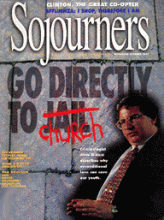Jim Wallis: What first drew you to the field of social policy?
John DiIulio: I grew up in a working-class/lower-middle-class neighborhood in a big city. Much of my scholarly work is in the field of American politics and public management. But no matter how much political philosophy I studied, Ive always felt a visceral need to get closer to the action. For example, Im not as much interested in the legislative process as Im interested in how laws affect the lives of living, breathing citizens. So the social policy interest grows out of an interest in public policy implementation, and that comes out of an interest in what matters at the grassroots level.
Wallis: You talk a lot about the role of churches and how you think they are essential to effective social policy. Why?
DiIulio: I grew up as a Roman Catholic, attend church regularly, have three children who are being raised as Catholics, but I never considered myself a particularly religious person. Faith and spirituality have played only the most indirect, incidental role in the research Ive done on youth crime, social service delivery, American politics, and public management.
A few years ago, however, I was trying to assess the independent effect of liquor outlets in high-crime urban neighborhoods. I discovered that, other things being equal, neighborhoods with a high concentration of liquor outlets had more crime, more delinquency, and more violence than otherwise comparable neighborhoods that did not. But there were other dots on the mapchurches. In the language of standard economics, the question was, If a high concentration of liquor outlets has negative externalities, does a high concentration of church activity have positive externalities?
Read the Full Article

